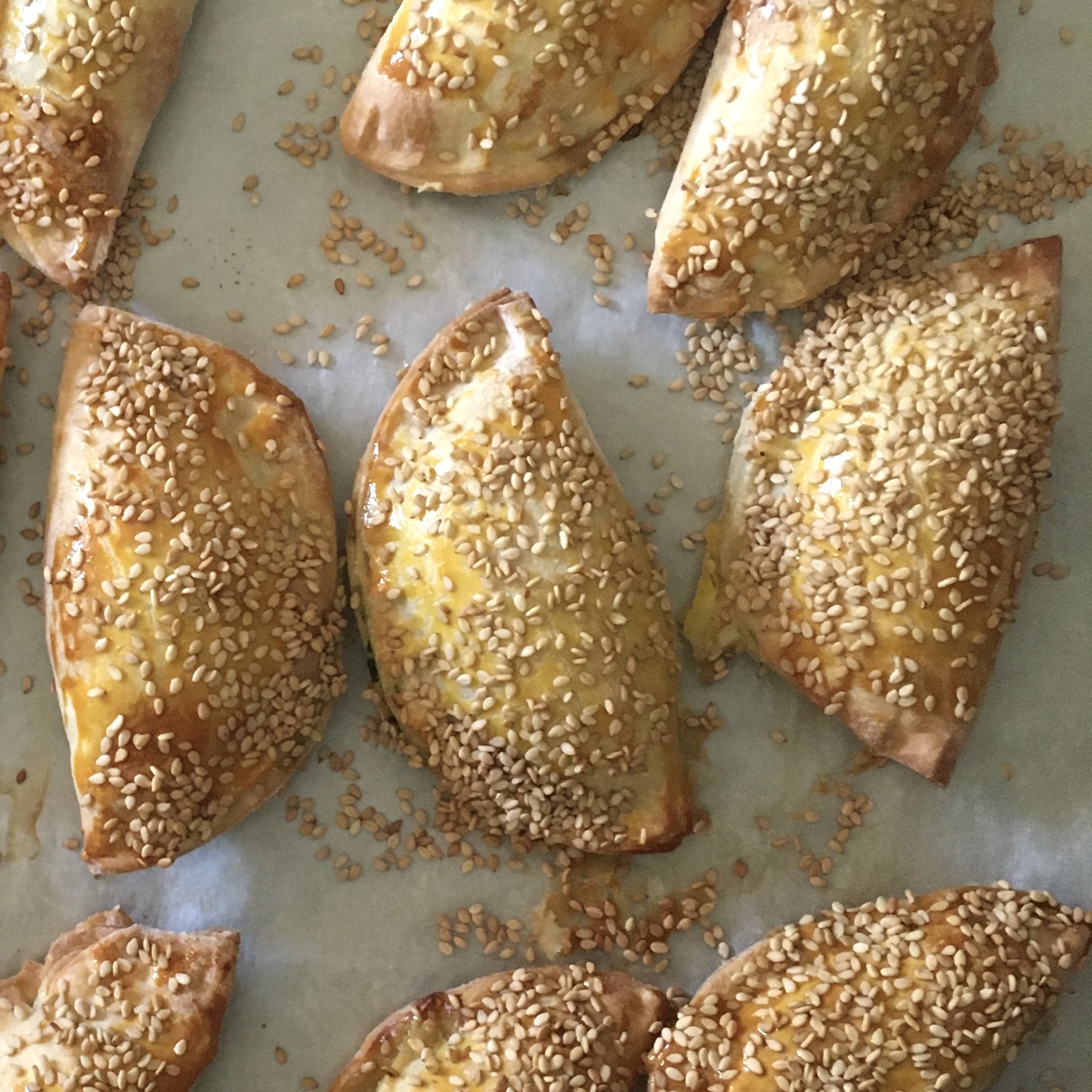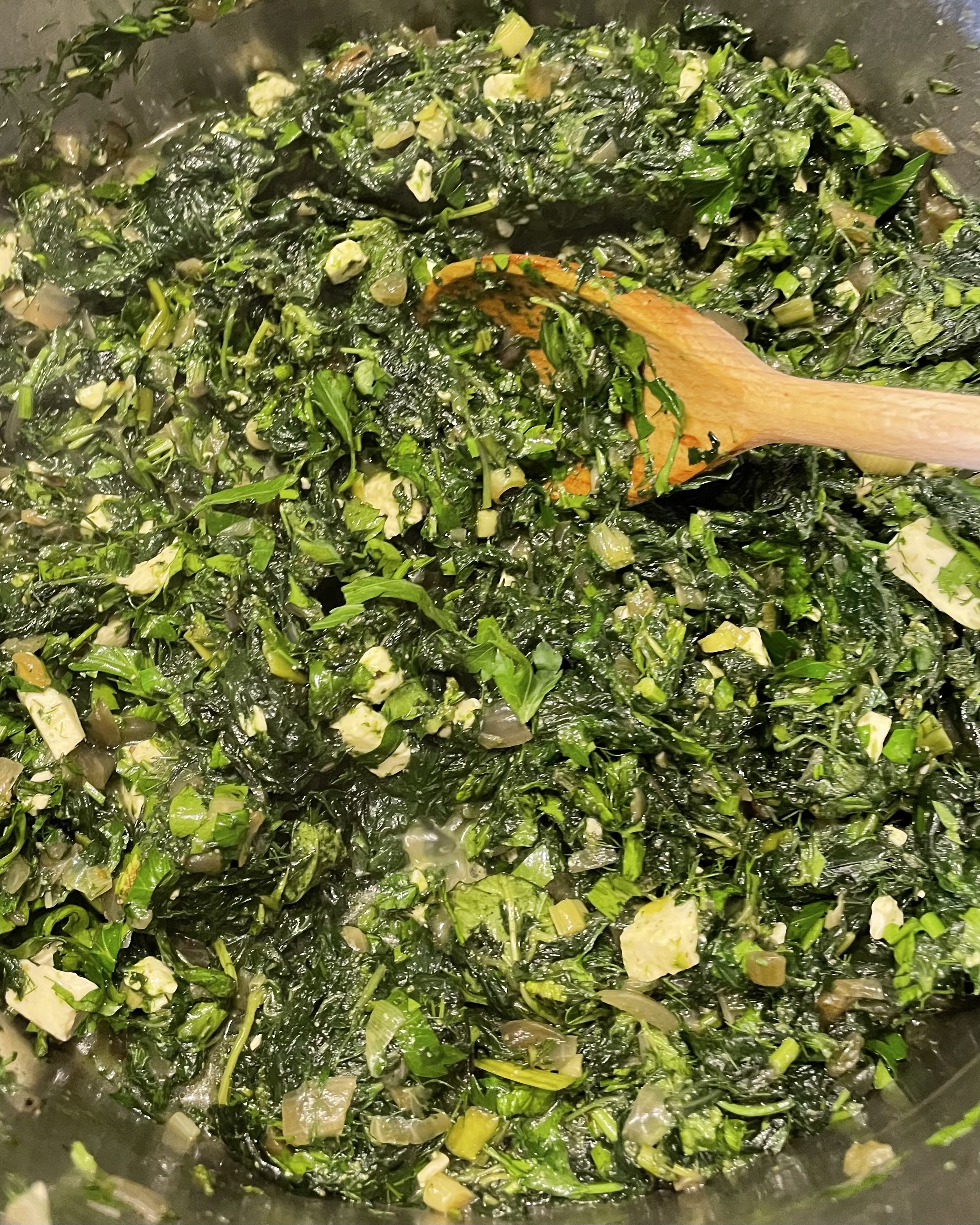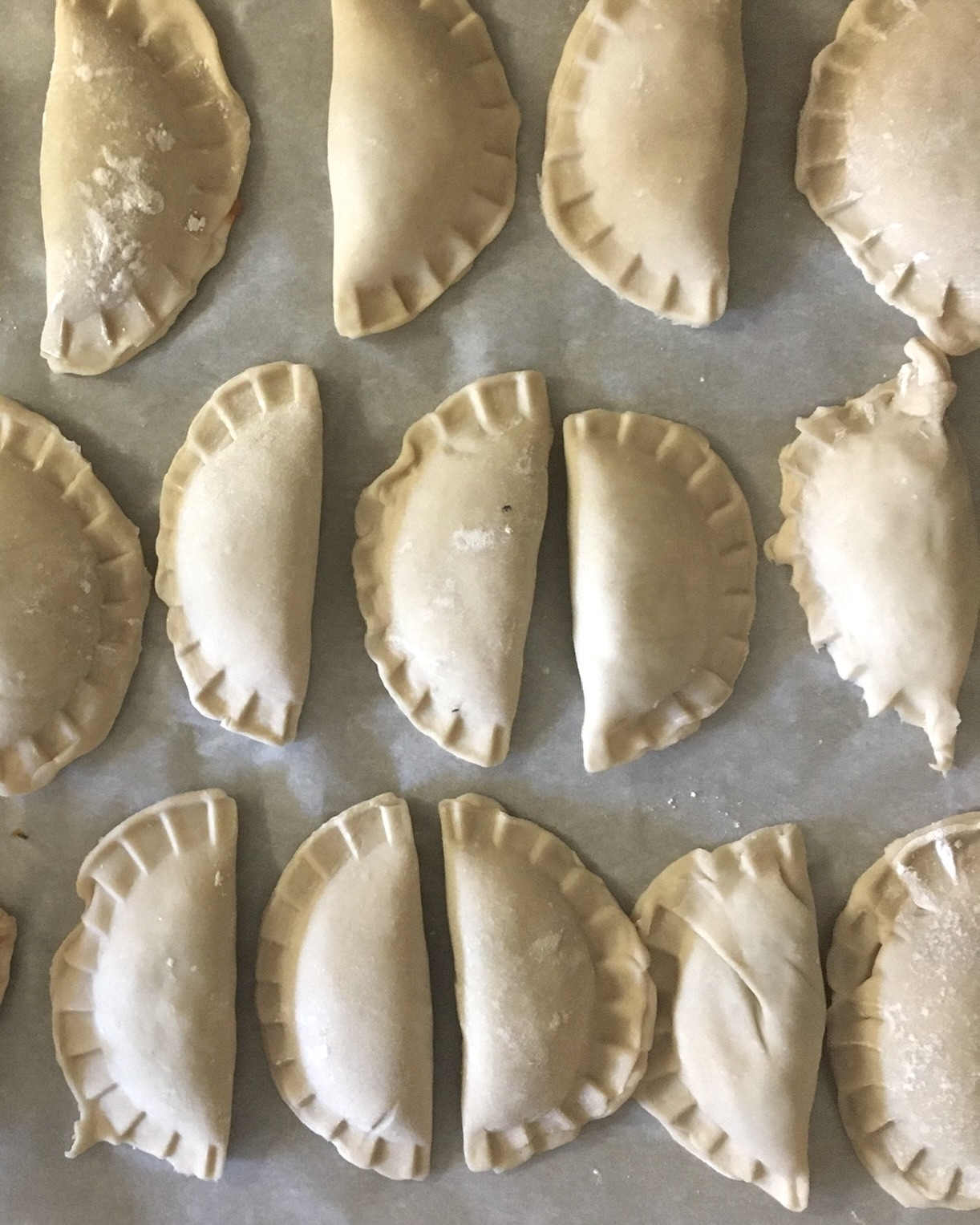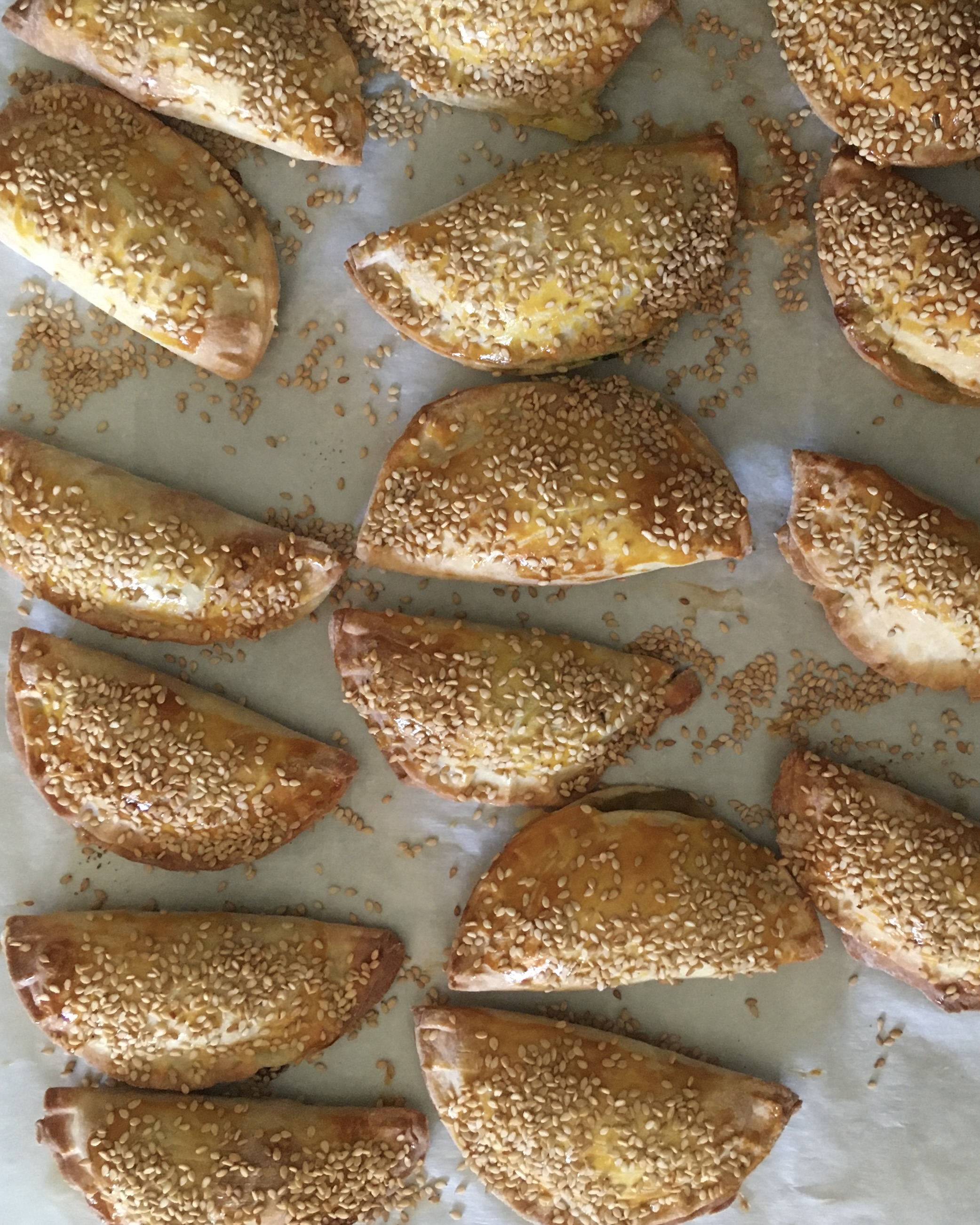𐘀𐘁𐘂𐘃𐘄𐘅𐘆 𐘣𐘤𐘥𐘦𐘧𐘨𐘩 𐚯𐚰𐚱𐚲𐚳𐚴𐚵 𐜟𐜠𐜡𐜢𐜣𐜤𐜥 𐚨𐚩𐚪𐚫𐚬𐚭𐚮 𐛋𐛌𐛍𐛎𐛏𐛐𐛑
Kaltsounia
Small, golden pastries filled with herbs and greens
Ninila — Festos

Kaltsounia were among the rare dishes that crossed every threshold — from the clay hearths of small courtyards to the kitchens of the palaces.
In Minoan Crete, they carried whatever the season offered: tender wild greens, soft curds of goat cheese, crushed herbs, or sweet fruit scented with honey and raki.
Each small pastry was both nourishment and gesture — a humble libation to the gods, a gift between friends, a token of domestic grace.
Though this version follows the wild-greens tradition, kaltsounia could be savory or sweet, filled with whatever the land or sea provided. They are, in essence, the story of the island’s abundance folded into dough.
Ninila wanted to learn how to make kaltsounia — the dish Sabaleon prepared for her almost every day, a quiet ritual of affection as constant as the morning light in their courtyard.
It had begun years earlier as a birthday gift, long before they were ever together as a couple.
Now, she wanted to surprise him on his own birthday the following month.
When she tries to recreate it herself, she discovers that no written measure can hold what the heart remembers.
The dough, the filling, even the flour that clings to her hands become part of something older — the rhythm of making, of learning by touch, and of cooking as an act of devotion.
What begins in chaos ends in laughter and understanding: that the art of food, like love, lives somewhere between the recipe and the soul.
The Flour Bomb

Ninila heard the front door open and the familiar sound of sandals dropping onto the stone floor.
“Saba, my love!” she called out. “How do you make dough for kaltsounia?”
“Kaltsounia?” Sabaleon’s voice drifted from the other room. “Some flour, some water, some salt, some raki, a bit of olive oil… maybe a touch of vinegar.”
“How much flour?” she asked.
“That depends,” he said. “How many kaltsounia do you want to make?”
She paused, trying to calculate by the size of their usual gatherings.
“Umm… twenty? Thirty?”
Sabaleon laughed. “So you want to feed us—or the entire Minoan navy?”
“Don’t be sarcastic with me,” she said, grinning. “Just enough for six or eight people—our usual crowd.”
“Alright then, two to two and a half cups,” he said.
Ninila brightened. “And what’s the water-to-flour ratio?”
“Ratio?” Sabaleon snorted. “You go by eye. By feel.”
She froze mid-scoop. “Oh no, oh no,” she muttered, her voice edging toward panic.
“That’s exactly what my mother said. How do you people measure by feel? Please help me, gods.”
Sensing her distress, Sabaleon walked into the kitchen—and stopped dead.
The room looked as if a flour bomb had exploded. White dust coated everything—her face, her arms, the table, even the floor.
She had tried, she really had: one cup of water to one cup of flour, as her “eye” instructed. The result was a bowl of soup.
“For the love of the gods, Ninila,” Sabaleon said, staring. “What happened here?”
“Don’t laugh.” Her voice trembled. “I swear, if you laugh, I’ll cry.”
He tried not to—he truly did. But with flour clinging to her eyebrows and dough splattered up her sleeve, his lips twitched.
The Feel of Dough

“And that’s how much your eye thought was right?” he asked, peeking into the bowl.
“Another sarcastic remark from you,” Ninila warned, gripping her rolling pin, “and this becomes a weapon.”
Sabaleon raised both hands. “Peace. How much flour and water did you use?”
“One cup of each,” she said defensively. “That’s what my eye felt was right.”
“I see. Did you add anything else?”
“Six and a half tablespoons of olive oil.”
He blinked. “What’s with the half?”
“Math,” Ninila said proudly. “My mother said six to seven, so I averaged.”
“Anything else?”
“Nope.”
“Alright. We need raki and salt.”
She handed him the bottle and the salt jar. He added a splash of raki and a pinch of salt.
“Trying to get them drunk?” she teased. “How much was that exactly?”
“A splash of raki and a pinch of salt,” he replied.
“By eye. By feel. A splash. A pinch.” Ninila groaned. “May the gods help me. Imagine if I used that kind of measuring on a construction site.”
Sabaleon chuckled. “Stick your finger in the soup— I mean, dough. If it sticks, you need more flour.”
She dipped her finger and lifted it, covered in dough. “I would say so.”
“Add one more cup of flour,” he said. “Mix until it comes together into a soft ball.”
Together, they worked the dough.
“Now touch it again,” he said. “Still sticking to your finger?”
She tested it. Clean.
“Then it’s ready. You just learned the ‘feel’ part. Cover it with a damp towel and let it rest.”
“It needs to rest?” Ninila asked, then continued, “Of course it does—it’s drunk.”
The Perfect Edge

While the dough rested, Sabaleon nodded toward the counter. “Let’s make the filling.”
“It’s done and draining,” Ninila said proudly, pointing to a ceramic colander in the sink.
Sabaleon took a spoonful and tasted it. “This filling is amazing, Nila. What’s in it?”
She picked up a clay tablet where she’d written the recipe.
“Two minas of greens—spinach, sorrel, and hartwort. Five scallions. One cup dill. Half a cup parsley. One cup mint leaves. Half a cup olive oil. One-third cup raki. Two small spoons salt. Two small spoons freshly ground long pepper.”
Sabaleon looked impressed. “How did you know how much salt to use?”
“Pataron told me,” Ninila said. “At first he said ‘by eye,’ but I asked—left or right eye? Then he explained: one small spoon of salt per mina of wet foods—greens, vegetables, or meats. The same for legumes, but measured after soaking. Then you taste and adjust.”
“I didn’t know that,” Sabaleon admitted, genuinely surprised.
After an hour, he said, “Alright, flour the table, the rolling pin too, and roll it thin—like this.” He held his thumb and forefinger about two millimeters apart.
When she finished, he nodded. “Good job, Nila. Now we need something round to cut the circles.”
“I have cutters,” she said, taking three terracotta rings tied with a ribbon from a hook on the wall. “Pick a size.”
Sabaleon chose the middle one. The rim was half smooth, half toothed—for grip, he thought—and the other side tapered sharp.
“Where did you get these?”
“I made them for my mother,” she said, smiling.
She cut as many circles as she could, re-rolled the scraps, and cut more until no dough was left.
“Now,” Sabaleon said, “put a spoonful of filling in each circle, wet the edge with your finger, fold it into a half-moon, and seal it with a fork—just don’t overdo it.”
Ninila followed his instructions but used the cutter instead, pressing the toothed edge into the dough. When she lifted it, the kaltsouni had a perfect crimped border.
Sabaleon stared. “That’s perfect! And in half the time! Nila, these are amazing—you’re amazing. You should market those!”
He hugged her and kissed her warmly.
At that moment, Zachria’s voice called from the hallway. “Marketing? That’s me! What are you marketing—and where are you two?”
“In the kitchen!” they shouted together.
Zachria stepped in, froze, and took in the scene. Both Ninila and Sabaleon were covered in white flour; the air shimmered with dust.
“Did you two invent explosive flour?” she asked. “I don’t think I can market that—but maybe I could try.”
They all burst into laughter.
While Ninila filled the kaltsounia, Sabaleon brushed a little olive oil over them and set them on a baking pan.
“Now we bake for half an hour,” he said.
Kaltsounia
Small, golden pastries filled with herbs and greens
Dough
- 2 cup (240 g) Flour
- 7 tbsp (105 ml) Olive oil
- 1 tsp (5 ml) Raki
- 1 shot (44 ml) Salt
- 1 cup (240 g) Water
- 0.5 cup (120 ml) Sesame seeds
Dough
- In a mixing bowl, combine the flour and olive oil. Add the salt, raki, and water. Mix well until a soft dough forms. Cover with a damp towel and let it rest for about 1 hour.
- Preheat the oven to 390°F (200°C). Roll the dough into a thin sheet, about 2–3 mm thick. Cut circles roughly 10 cm in diameter.
- Place 1 teaspoon of filling in the center of each circle. With a wet finger, moisten the edges, fold into a half-moon, and press the edges gently with a fork to seal.
- Brush lightly with olive oil and sprinkle with sesame seeds.
- Place on a baking tray and bake at 390°F (200°C) for about 20 minutes, or until golden.
Serve with Greek yogurt mixed with chives.
You could double the butch and freeze half